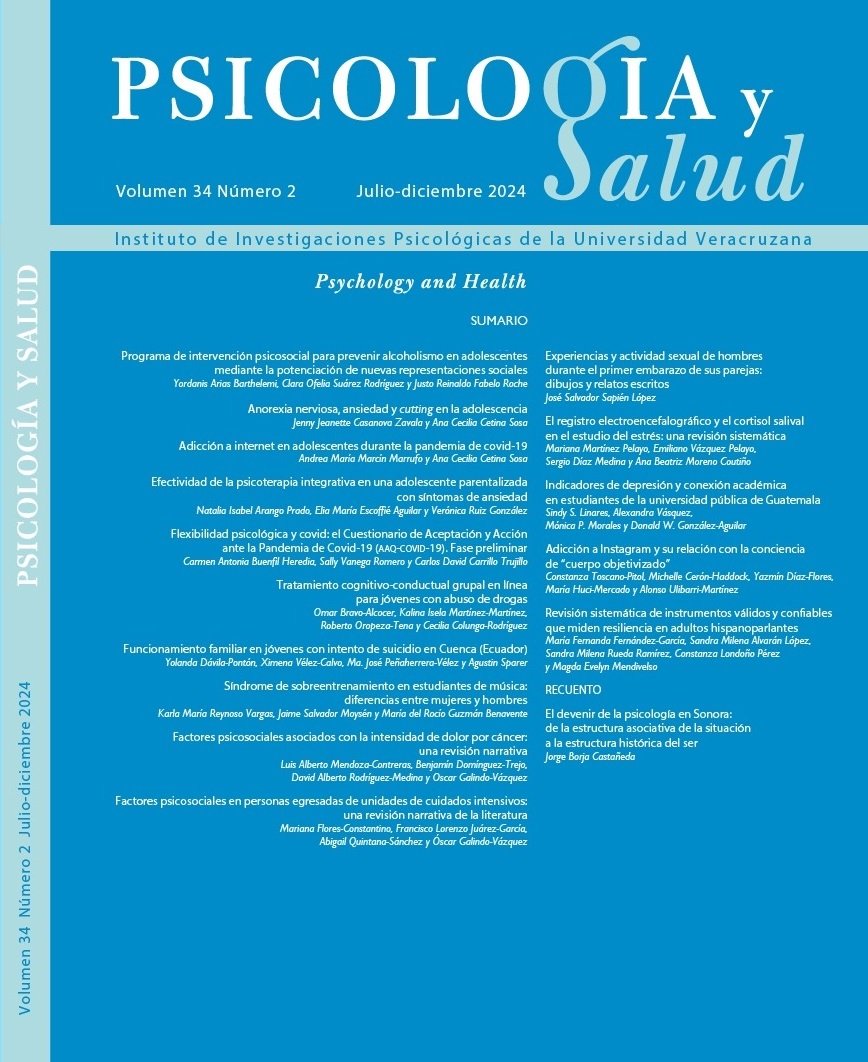Abstract
The main objective of the present study was to examine the relationship between Instagram addiction and objectified body awareness. The sample involved 248 Mexican participants, 68% women and 100% claimed to be users of the Instagram social network. Age ranged from 18 to 24 years, averaging 21 years. The methodology was quantitative and correlational, and contributors agreed to participate voluntarily. The participants showed a slightly above-average addiction to Instagram that correlated positively with factor 1 of the Self Objectification Scale, Self-vigilance, and negatively with factor 2 (Body shame). The present study showed that physical appearance is not significantly related to the use of Instagram and that, on the contrary, less body shame is associated with using this social network. Within the scope of this study, results suggest that using Instagram may bring advantages but also disadvantages, as social media can facilitate social support and the strengthening of self-concept. However, it is also possible for it to lead to self-exploitation. Therefore it is essential to make society aware of this app's moderate and safe use.
References
Anderson, M. y Jiang, J. (2018). Teens, social media and technology. Pew Research Center [Internet y American Life Project], 1–9. Recuperado de http://publicservicesalliance.org/wp-content/uploads/2018/06/Teens-Social-Media-Technology-2018-PEW.pdf
Andreassen, C.S., Pallesen, S. y Griffiths, M.D. (2017). The relationship between addictive use of social media, narcissism, and self-esteem: Findings from a large national survey. Addictive Behaviors, 64, 287-293.
Bard W., G. y Magallanes U., M.L. (2021). Instagram: la búsqueda de la felicidad desde la autopromoción de la imagen. Culturales, 9, 1-29. Doi: 10.22234/recu.20210901.e519
Becoña, E. (2006). Resiliencia: definición, características y definición del concepto. Revista de Psicopatología y Psicología Clínica, 11(3), 125-146.
Brehm, S., Miller, R., Perlman, D. y Campbell, S. (2002). Intimate relationships. McGraw-Hill.
Caro C., L. (2022). Jugando a ser influencers: un estudio comparativo entre jóvenes españoles y colombianos en Instagram. Comunicacion y Sociedad, 35(1), 81-99.
Chávez S., A. y Vallejos F., M.A. (2021). Diseño y validez de la Escala de Adicción a Instagram de Bergen (BIAS) en adultos peruanos. Propósitos y Representaciones, 9(1). Doi: 10.20511/pyr2021.v9n1.973
Cwynar-Horta, J. (2016). The commodification of the body posiive movement on Instagram. Stream: Culture/ Politics/ Technology, 8(2), 36-56. Doi: 10.5027/psicoperspectivas-vol19-issue1-fulltext-1834
Del Prete, A. y Redon P., S. (2020). Las redes sociales on-line: espacios de socialización y definición de identidad. Psicoperspectivas, 19(1), 86-96.
Díaz, B., Ventisca, M. y Llovet R., C. (2017). ¿Empoderamiento o empobrecimiento de la infancia desde las redes sociales? Percepciones de las imágenes de niñas sexualizadas en Instagram. Profesional de la Información, 26(1), 77-87.
Domínguez, C., Mijares S., A., Acosta, T., Navarro, G. y Ruiz, Z. (2012). La deseabilidad social revalorada: más que una distorsión, una necesidad de aprobación social. Acta de Investigación Psicológica, 2(3), 808-824.
Fredrickson, B. y Roberts, T.A. (1997). Objectification theory: Toward understanding women's lived experiences and mental health risks. Psychology of Women Quarterly, 21, 173-206. Doi: 10.1111/j.1471-6402.1997.tb00108.x
Gordon, M.K. (2008). Media contributions to African American girls' focus on beauty and appearance: exploring the consequences of sexual objectification. Psychology of Women Quarterly, 32(3), 245-256. Doi: 10.1111/j.1471-6402.2008.00433.x
Kerlinger, F. (1988). Investigación del comportamiento (4ª ed.). McGraw-Hill.
McKinley, N.M., Hyde, J.S. (1996). The Objectified Body Consciousness Scale: development and validation. Psychology of Women Quarterly, 20(2), 181-215. Doi:10.1111/j.1471-6402.1996.tb00467.x
Morán P., N. y Felipe C., E. (2021). Self-concept in social networks and its relation to the affect in adolescents1. Behavioral Psychology, 29(3), 611-625. Doi: 10.51668/bp.8321306n
Moya G., A., López M., J., Rodríguez B., R.M. y Moya M., M.C. (2017). Spanish version of the Objectified Body Consciousness Scale (OBCS). Results from two samples of female university students. International Journal of Social Psychology, 32(2), 377-394.
Oropesa M., P. y Sánchez X., C. (2016). Motivaciones sociales y psicológicas para usar Instagram. Communication Papers, 5(09), 27-36.
Rodríguez P., A.P. y Fernández P., A. (2014). Relación entre el tiempo de uso de las redes sociales en internet y la salud mental en adolescentes colombianos. Acta Colombiana de Psicología, 17(1), 131-140. Doi: 10.14718/ACP.2014.17.1.13
Siibak, A. (2009). Constructing the self through the photo selection: visual impression management on social networking websites. Cyberpsychology: Journal of Psychosocial Research on Cyberspace, 3(1), 1. Recuperado de http://cyberpsychology.eu/view. php?cisloclanku=2009061501yarticle=1
Waters, R. (2014). Instagram®: How Kevin Systrom and Mike Krieger changed the way we take and share photos. Simon & Schuster.

This work is licensed under a Creative Commons Attribution 4.0 International License.
Copyright (c) 2024 Psychology and Health

